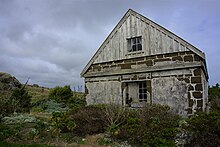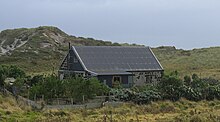
The Chatham Islands (/ˈtʃætəm/ CHAT-əm) are an archipelago in the Pacific Ocean about 800 km (430 nmi) east of New Zealand's South Island, administered as part of New Zealand. The first inhabitants, the Moriori, suffered disease outbreaks from European contact beginning around c. 1800, as well as invasion, genocide, and enslavement in 1835 by the Māori of two iwi from Taranaki. Māori steadily returned to Taranaki over the 1860s, leasing land on the islands to Pākehā herders, who settled and constructed sheep stations on the islands. Registered historic buildings in the Chathams primarily comprise houses and cottages constructed in the late 19th century, following the construction of Hough Cottage (the earliest surviving building on the islands) c. 1860.
Heritage New Zealand classification of sites on the New Zealand Heritage List / Rārangi Kōrero, in accordance with the Heritage New Zealand Pouhere Taonga Act 2014, distinguishes between Category 1 ("places of special or outstanding historical or cultural significance") and Category 2 ("places of historic or cultural significance"). Sites important to Māori or Moriori communities are given special classifications, including Wāhi Tapu for sites of spiritual, traditional, or ritual importance. Ten locations in the Chatham Islands are listed on the New Zealand Heritage List. Nine are located on the main island of Chatham, while one, Whaler's Cottage, is on neighboring Pitt Island. Two additional sites — Hunts Forge on Pitt Island and Zimmerman House at Waitangi West on Chatham — were initially listed as Category 2 sites, but were later destroyed and removed from the list.
Extant sites
| Name | Classification | Location | Constructed | Registered | Type | List number |
Notes | Image | Citation |
|---|---|---|---|---|---|---|---|---|---|
| Hough Cottage | Category 2 | Waitangi, Chatham | c. 1860 | 1991 | House | 5387 | A cottage built around 1860, thought to be oldest surviving building in the Chatham Islands. | ||
| German Mission House | Category 1 | Waitangi West, Chatham | 1866–1868 | 1991 | House | 5401 | A cottage built from 1866 to 1868, constructed from local wood and stone. Constructed by Johannes Engst and Johann Baucke, Moravian missionaries to the Chathams who had first arrived in 1843, as well as Johann's son William Baucke. | 
|
|
| Ponga Whare | Category 1 | Wharekauri Station, Chatham | 1867 | 1992 | House | 5399 | A temporary residence constructed by Hauhau Māori convict laborers for station owner William Chudleigh. Built from timber and ponga logs, originally with a thatched roof, although it is now corrugated iron. | ||
| Whaler's Cottage | Category 2 | Glory Bay, Pitt Island | 1869 | 1991 | House | 5386 | A largely unaltered timber cottage, built in the late 1860s by William Gordon Jacobs at the behest of Frederick Hunt. Briefly served as accommodations for visiting whaler crews on Pitt Island. | ||
| Meikle House | Category 2 | Te One, Chatham | c. 1870 | 1991 | House | 5397 | A house initially owned by D. H. Meikle, an American whaler and smuggler. Various additions have been added since its construction shortly after 1870. | ||
| Whangamarino Woolshed | Category 2 | Waitangi Wharf-Owenga Rd., Chatham | 1870 | 1991 | Woolshed | 5396 | The Whangamarino Woolshed is one of the two oldest woolsheds on Chatham Island still in use. Built in 1870 by F. Cox and Alexander Shand from local timber. | ||
| Nairn House | Category 1 | Waitangi, Chatham | 1882–1886 | 1991 | House | 5400 | A two-storey colonial house built by William Baucke for Walter Hood, a prominent local trader and farmer. Described as the "most notable and historic building" on the Chathams by Heritage New Zealand. Fashioned from kauri wood, with a corrugated iron roof. Served as accommodation for visiting dignitaries. | ||
| St Augustine's Church (Anglican) |
Category 2 | Te One, Chatham | 1885 | 1991 | Church | 5389 | An Anglican church in Te One. Its construction was sponsored by various locally prominent families, including the station-owners Chadleigh and Raynor. The interior of the church includes kauri paneling and lining. | 
|
|
| Solomon Homestead | Category 1 | Manukau, Chatham | 1903–1916 | 1991 | House | 5395 | A hipped-roof villa built with corrugated iron roofs and walls, as well as internal lining fashioned from kauri, scrim, and paper. Construction initiated by Rangitapua Horomona Pehe in 1903, and finished by Tommy Solomon and his second wife in 1916. Served as Solomon's home until his death. Currently in dilapidated condition. | ||
| Tommy Solomon Statue | Wāhi Tapu | Manukau, Chatham | 1986 | 2009 | Monument | 9281 | A statue of Tommy Solomon, the last full-blooded Moriori. Located at Manukau, a Moriori reserve and Solomon's resting place. It was commissioned in 1984 by the Solomon families, and dedicated in December 1986 by Prime Minister David Lange. |
Former sites
These sites were formerly listed on the New Zealand Heritage List, but are no longer extant.
| Name | Classification | Location | Constructed | Type | List
number |
Notes | Citation |
|---|---|---|---|---|---|---|---|
| Hunts Forge | Category 2 | Flower Pot-Glory Rd., | 1859 | Forge | 5388 | Constructed by Frederick Hunt in 1859 using materials sourced from a shipwreck. Burnt down at some point between 2000 and 2004. | |
| Zimmerman House | Category 2 | Waitangi West, Chatham | N/A | House | N/A | Demolished at some point between 1999 and 2010. |
References
Citations
- ^ Richards, Rhys (12 September 2012). "Story: Chatham Islands". Te Ara: The Encyclopedia of New Zealand. pp. 3–4. Archived from the original on 5 December 2023. Retrieved 8 May 2024.
- ^ "Hough Cottage". Heritage New Zealand. Archived from the original on 27 December 2023. Retrieved 8 May 2024.
- "Historic Places". Chatham Islands Council. Archived from the original on 8 May 2024. Retrieved 8 May 2024.
- ^ "New Zealand Heritage List – Rārangi Kōrero". Heritage New Zealand. Archived from the original on 26 March 2014. Retrieved 8 May 2024.
- HNZPTA 2014.
- ^ Dangerfield 2010, pp. 15–16.
- "German Mission House". Heritage New Zealand. Archived from the original on 27 December 2023. Retrieved 8 May 2024.
- "Ponga Whare". Heritage New Zealand. Archived from the original on 10 May 2024. Retrieved 8 May 2024.
- "Whaler's Cottage". Heritage New Zealand. Archived from the original on 10 May 2024. Retrieved 8 May 2024.
- "Meikle House". Heritage New Zealand. Archived from the original on 27 December 2023. Retrieved 8 May 2024.
- "Whangamarino Woolshed". Heritage New Zealand. Archived from the original on 27 December 2023. Retrieved 8 May 2024.
- "Nairn House". Heritage New Zealand. Retrieved 8 May 2024.
- "St Augustines Church (Anglican)". Heritage New Zealand. Archived from the original on 27 December 2023. Retrieved 8 May 2024.
- "Solomon Homestead". Heritage New Zealand. Archived from the original on 27 December 2023. Retrieved 8 May 2024.
- "Tommy Solomon Statue". Heritage New Zealand. Archived from the original on 28 December 2023. Retrieved 8 May 2024.
- "Tommy Solomon Statue". Tourism Chatham Islands. 2022. Archived from the original on 8 May 2024. Retrieved 8 May 2024.
- "Lost Heritage". Heritage New Zealand. 2023. Archived from the original on 5 May 2024. Retrieved 9 May 2024.
- Department of Conservation 1999.
Bibliography
- Heritage New Zealand Pouhere Taonga Act (s. 65). New Zealand Parliament. 19 May 2014. Retrieved 9 May 2024.
- Dangerfield, Alison (30 October 2010). "The House that Engst Built". Architectural History Aotearoa. 7: 13–19. doi:10.26686/aha.v7i.6786. Archived from the original on 10 May 2024. Retrieved 9 May 2024.
- Chatham Islands Conservation Management Strategy (PDF) (Report). Department of Conservation. August 1999. Archived (PDF) from the original on 14 June 2023. Retrieved 9 May 2024.